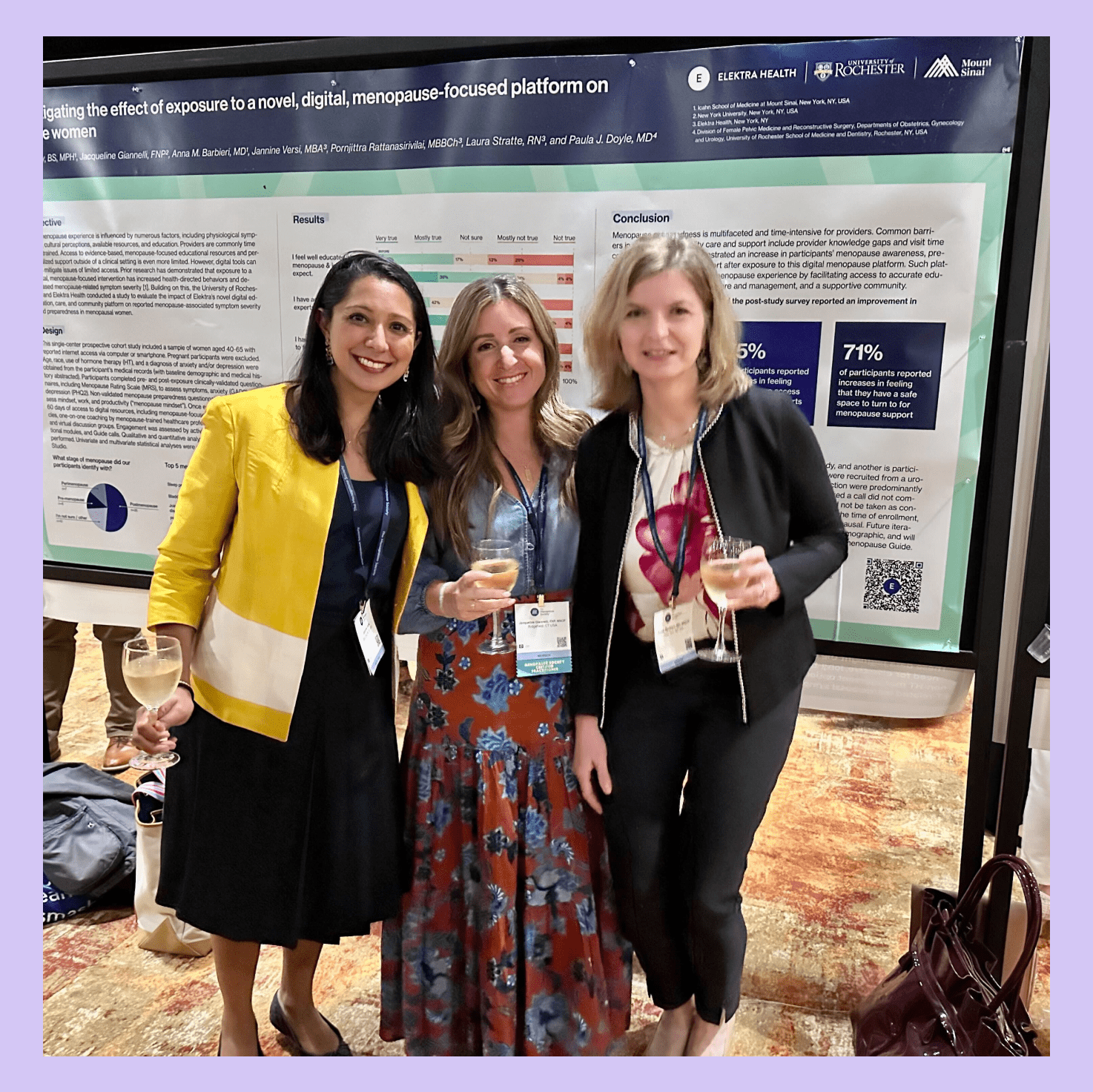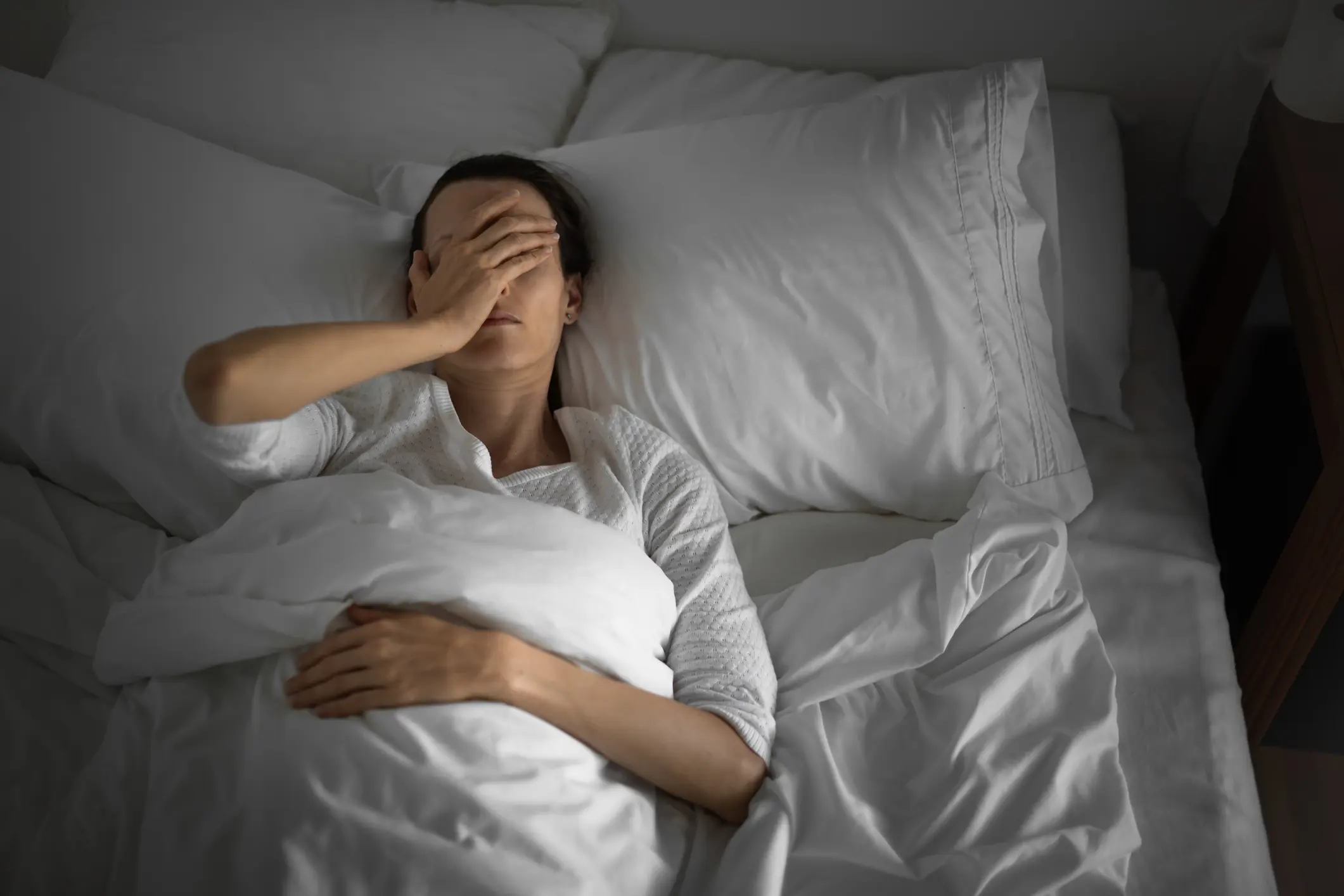
Published on Oct 02, 2023
Last modified on Oct 02, 2023
5 Cutting-Edge Research Developments From The 2023 Menopause Society Conference
3 min read

We’re thrilled to have attended The Menopause Society’s annual meeting last week for the third year in a row! Elektra Co-Founder & COO Jannine Versi was joined by our founding clinical team Anna Barbieri, MD and Jackie Giannelli, FNP to present our poster and catch up with the incredible movers and shakers in the menopause space.
There was no shortage of cutting-edge research presented at the meeting, from cannabis to racial disparities in menopause care. Below are five highlights.
1. The most prevalent barriers accounting for disparities in menopausal hormone therapy are…
After a scoping review, researchers identified three main barriers: age, race, and education.
- Age: the most common disparity, with older women prescribed more often than younger women
- Race: in the review, Black women were prescribed and counseled about menopausal hormone therapy less often than other groups
- Education: women with less education were prescribed and counseled about hormone therapy less often than those with higher education
“Lack of education on menopause and on the benefits of menopausal hormone therapy, as well as implicit bias, are contributing to disadvantaged groups and many women not receiving adequate counseling and treatment about hormone therapy,” explained Danette Conklin, PhD and Sally MacPhedran, MD.
Read more about the research here.
RELATED:
- Elektra Guide To Hormone Replacement Therapy
- There Are Serious Racial & Ethnic Disparities in Menopause Care
2. Adults 50+ are the fastest-growing cannabis users…and they’re using it to manage menopause symptoms
Following the legalization and normalization of cannabis, a new study shows that more women than ever are using it during or after menopause for medical or recreational reasons.
Results indicated that cannabis was being used to treat chronic pain (28%), anxiety (24%), sleep problems (22%), and stress (22%). 6% of patients reported the use of cannabis specifically for menopause symptoms, the primary ones being menopause-related mood changes and sleep problems.
Read more about the study here.
RELATED: Elektra Guide To Supplements For Menopause
3. Intense hot flashes may be associated with a marker of future heart disease and Alzheimer’s
Those pesky hot flashes may be more dangerous than previously thought, according to a new unpublished study presented at The Menopause Society conference last week.
It all comes down to something called C-reactive protein. An intense hot flash is associated with an increase in this protein, which is a marker of future heart disease and a blood biomarker that may predict a later Alzheimer’s diagnosis.
Read more about the study here.
RELATED:
4. Obesity is linked to worse menopause symptoms and less effective hormone therapy
Very little research to date has been done on the impact of comorbidities (like obesity) on hormone therapy efficacy during menopause…until now.
This five-year study of 119 patients found that women with obesity experienced:
- An increase in menopause symptom prevalence
- Lower efficacy of hormone therapy
While there were no statistically significant differences between the obese and non-obese groups when it came to age, duration of menopause, or use of hormone therapy, women with obesity were more likely to self-identify as Black and report hot flashes, genitourinary/vulvovaginal symptoms, mood disturbances, and decreased libido.
“Considering that more than 40% of women over the age of 40 are classified as obese according to the CDC, these results could be meaningful to a large percentage of patients transitioning through menopause,” explained Dr. Stephanie Faubion, medical director of The Menopause Society.
Read more about the study here.
RELATED:
- Elektra’s Full Guide To Weight Gain During Menopause
- Yes, “Menopause Belly” is Normal. Here’s What You Can Do About It.
- Is Keto Safe & Effective For Menopause?
- The 101 On Intermittent Fasting During Menopause
- Appetite Through The Roof During Menopause? You’re Not Alone.
5. Access to digital menopause tools impacts symptom severity & preparedness
Elektra Health partnered with University of Rochester to evaluate how digital tools like ours with education, care, and community impact menopausal women.
50 women ages 40-65 enrolled in the study and were given an 8-week membership to Elektra Health. Participants were asked to complete an assessment about symptoms, feelings about menopause, and work/productivity at the beginning and end of their membership.
Here were the key findings, which we presented for the first time at last week’s meeting:
- 17 (71%) participants reported increases in feeling educated about menopause and knowing what to expect
- 18 (75%) participants reported increases in feeling that they have access to menopause experts when they need them
- 17 (71%) participants reported increases in feeling that they have a safe space to turn to for menopause support
- 22 (92%) participants who completed the post-study survey reported an improvement in 1 or more of the 3 questions about menopause education/preparedness, access to experts, and having a safe space to turn to for menopause support
- Every participant who completed ≥1 call with an Elektra Guide reported an improved response to 1 or more of the 3 questions relating to menopause mindset
Read more about the study here.


